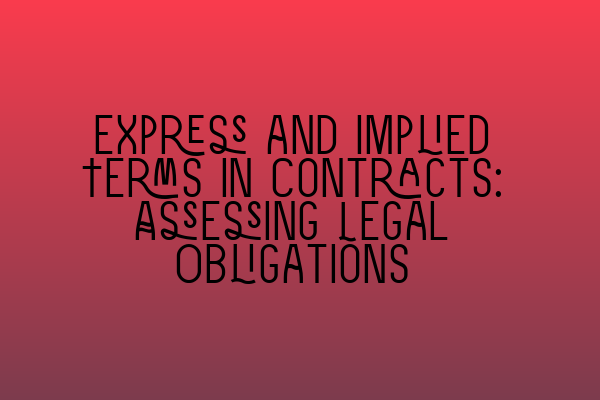Express and Implied Terms in Contracts: Assessing Legal Obligations
Welcome to SQE Contract Law, your trusted source for all things related to contract law. In this blog post, we will be exploring the concepts of express and implied terms in contracts and how they impact legal obligations. Whether you are a solicitor, law student, or simply interested in contract law, this article will provide you with valuable insights. So, let’s dive right in!
What are Express Terms?
Express terms in a contract are those that are specifically agreed upon and stated by the parties involved. These terms can be in written or verbal form, depending on the nature of the contract. Express terms are crucial as they define the rights and obligations of each party and provide clarity on the contractual relationship.
When drafting a contract, solicitors must ensure that all important terms are clearly expressed to avoid any misunderstandings or disputes. This includes specifying the price, delivery dates, payment terms, and any other essential details. By clearly stating these terms, solicitors contribute to the overall effectiveness and enforceability of the contract.
For a deeper understanding of the legal challenges and pitfalls in your practice, we recommend reading our article on Navigating Legal Challenges and Pitfalls in Your Practice.
Implied Terms: The Unspoken Obligations
Implied terms, on the other hand, are not expressly stated in the contract but are still considered binding by law. These terms are inferred by the courts or implied based on the nature of the contract, the parties’ intentions, and the customs of the trade.
One common example of an implied term is the duty of care in a sale of goods contract. While the contract may not explicitly state that the seller must ensure the goods are of satisfactory quality, this obligation is implied by the Sale of Goods Act 1979. It is essential for solicitors to be aware of these implied terms so they can properly advise their clients and negotiate contracts that reflect the parties’ true intentions.
For a comprehensive comparison between being a barrister and a solicitor, check out our article on Barrister vs. Solicitor: A Comprehensive Comparison.
When Do Implied Terms Arise?
Implied terms can arise in various situations, including:
- Statutory implied terms: These are terms that are implied by legislation, such as the Sale of Goods Act, Consumer Rights Act, or Supply of Goods and Services Act. These Acts set out certain rights and obligations that automatically apply to contracts falling within their scope.
- Customary implied terms: Certain industries or trades have their own customs and practices, which may imply specific terms in contracts within that industry. Solicitors need to be aware of these customary implied terms to protect their clients’ interests.
- Implied terms through previous dealings: If the parties have had previous dealings or have a history of contracts between them, certain terms may be implied into the current contract based on the parties’ past conduct and course of dealing.
Understanding the SRA Competence Statement is crucial for solicitors to ensure they have the necessary skills and knowledge to practice law effectively. To learn more about it, we recommend reading our guide on Understanding the SRA Competence Statement: A Guide for Solicitors.
Unwritten but Legally Binding
It is important to note that both express and implied terms are legally binding on the parties involved. While express terms are explicitly stated in the contract, implied terms can still carry significant weight and legal obligations. Solicitors must ensure that their clients are aware of these implied terms and understand their implications.
In some cases, the court may also imply terms to fill in gaps and make the contract workable. This is known as the officious bystander test, which asks what terms would be implied into the contract based on what reasonable people would agree to.
For solicitors looking to specialize in a specific area of law, we recommend exploring different solicitor specializations. Finding your niche can help you build a successful and fulfilling career. Check out our article on Exploring Different Solicitor Specializations: Finding Your Niche for more information.
In Conclusion
Express and implied terms play a vital role in contract law, defining the rights and obligations of the parties involved. Express terms are explicitly stated in the contract, while implied terms arise through legislation, customs, or previous dealings. Both types of terms are legally binding and require careful consideration by solicitors.
To ensure a successful career in contract law, it is essential to receive quality education. Check out our recommendations for law schools in the UK in our article on Top Recommendations for Law Schools in the UK.
We hope you found this article informative and valuable. If you have any further questions or require legal assistance, please do not hesitate to reach out to SQE Contract Law. We are here to help!
